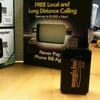A Reply Brief in support of Emergency Motion for Partial Stay was filed today by Nuvio and other appellants with the U.S. Court of Appeals DC Circuit to prevent the FCC e911 rules to go into effect on November 28th. I have a copy of the filing and haven't entirely digested it all, but here are some excerpts taken directly from the filed brief.
In this case, Movants challenge the FCC’s adoption of rules that require all “interconnected VoIP providers” (“IVPs”) to implement nationwide E-911 service capabilities within an arbitrary 120-day period, and prohibit them from serving any customers where these capabilities do not exist. Respondents, not surprisingly, focus on the public interest in having emergency services available, and wax eloquent about the importance of public safety, while remaining vague about the feasibility of compliance with the 120-day mandate.
Movants share the FCC’s concern for public safety, but cannot perform the impossible. The agency, in its understandable zeal to prevent “tragedies,” rushed to an emotional decision without considering the practical implications of its requirements. The issue presented by the instant Motion is not whether VoIP users should have access to E911 services. The Court may agree that such a requirement is reasonable, and still conclude that it was arbitrary and capricious for the FCC to adopt a patently infeasible implementation schedule and to exclude businesses from the market when they can’t meet it. Respondents contend that IVPs will not sustain irreparable harm absent a stay, because of the FCC’s eleventh-hour Public Notice (“Notice”) saying it will not enforce the rules to the extent they require disconnection of existing customers.
The Notice is irrelevant because it does not eliminate the binding effect of the rules, nor does it prevent the agency from taking enforcement action at its discretion. Further, Movants have shown that their businesses will be severely and irreparably disrupted even if they do not have to disconnect existing customers. Respondents deny that the FCC’s treatment of VoIP departed dramatically from its consideration of 911 calling requirements for other services, particularly wireless. Their argument, however, relies on a series of non sequiturs, and fails to provide the required explanation for an abrupt change in agency policy.
Although cell-phone service was introduced in the 1980’s, the FCC did not require that these phones be capable of handling 911 calls until 1996.3 It then gave wireless carriers a full year to implement basic 911 service, and 18 months to be capable of relaying a caller’s telephone number to the 911 system.
Here, by contrast, it required implementation of full enhanced 911 capabilities (including relaying both telephone numbers and locations) within 120 days. Respondents suggest that implementation for VoIP should be easier because it can reuse some “network components” originally developed for wireless 911. (Opp. at 9-10.) This argument is disingenuous at best, considering that the FCC has failed to take essential steps to make those network components available to IVPs. Despite being told in August that appointment of a “Routing Number Administrator” was essential to permit IVPs to use the “p-ANI” codes developed for wireless 911, the agency still has not done so.
It also refused to impose any obligation on traditional telephone companies to provide network access to IVPs, although the wireless carriers do have an enforceable right to such access. Due to these FCC omissions, it is likely to be harder, not easier, for IVPs to implement 911 than it was for wireless carriers.
The filed brief concludes with "For the foregoing reasons, Movants respectfully request that the Court stay the effectiveness of 47 C.F.R 9.5(b) and (c), to the extent they require full implementation of E911 access for both existing and new customers of nomadic services by November 28, 2005."
I agree with the Nuvio filing and have already expressed my disgust with the FCC's decision, so let's hope Nuvio and specifically the courts rule wisely and according to past prescedent.
android apple asterisk at&t blackberry cell phone cisco dell digium e911 facebook fcc google google talk gps im ip-pbx ipad iphone ipod itexpo ITEXPO lync microsoft mobile phone open source outage phone review sip skype sony unified communications verizon video video conferencing voip vonage wireless xbox 360
- Apple (280)
- Bittorrent (2)
- Call Center and CRM (48)
- Computer Hardware (183)
- Computer Software (71)
- Gadgets (650)
- Google (225)
- Home Entertainment (263)
- Internet (173)
- Linux (111)
- Microsoft (376)
- MovableType (48)
- News (187)
- Personal and Humor (118)
- Politics (9)
- Reviews (246)
- Security (2)
- Social Networking (42)
- Sports/Outdoor Technology (9)
- Tablets (32)
- Technology and Science (355)
- Unified Communications (471)
- VoIP (2285)
- Wireless (584)
- p2p (20)
- March 2014
- February 2014
- January 2014
- December 2013
- November 2013
- October 2013
- September 2013
- August 2013
- July 2013
- June 2013
- May 2013
- April 2013
- March 2013
- February 2013
- January 2013
- December 2012
- November 2012
- October 2012
- September 2012
- August 2012
- July 2012
- June 2012
- May 2012
- April 2012
- March 2012
- February 2012
- January 2012
- December 2011
- November 2011
- October 2011
- September 2011
- August 2011
- July 2011
- June 2011
- May 2011
- April 2011
- March 2011
- February 2011
- January 2011
- December 2010
- November 2010
- October 2010
- September 2010
- August 2010
- July 2010
- June 2010
- May 2010
- April 2010
- March 2010
- February 2010
- January 2010
- December 2009
- November 2009
- October 2009
- September 2009
- August 2009
- July 2009
- June 2009
- May 2009
- April 2009
- March 2009
- February 2009
- January 2009
- December 2008
- November 2008
- October 2008
- September 2008
- August 2008
- July 2008
- June 2008
- May 2008
- April 2008
- March 2008
- February 2008
- January 2008
- December 2007
- November 2007
- October 2007
- September 2007
- August 2007
- July 2007
- June 2007
- May 2007
- April 2007
- March 2007
- February 2007
- January 2007
- December 2006
- November 2006
- October 2006
- September 2006
- August 2006
- July 2006
- June 2006
- May 2006
- April 2006
- March 2006
- February 2006
- January 2006
- December 2005
- November 2005
- October 2005
- September 2005
- August 2005
- July 2005
- June 2005
- May 2005
- April 2005
- March 2005
- February 2005
- January 2005
- December 2004
- November 2004
- October 2004
- September 2004
- August 2004
- July 2004
- June 2004
- May 2004
- April 2004
- March 2004
Featured Videos













